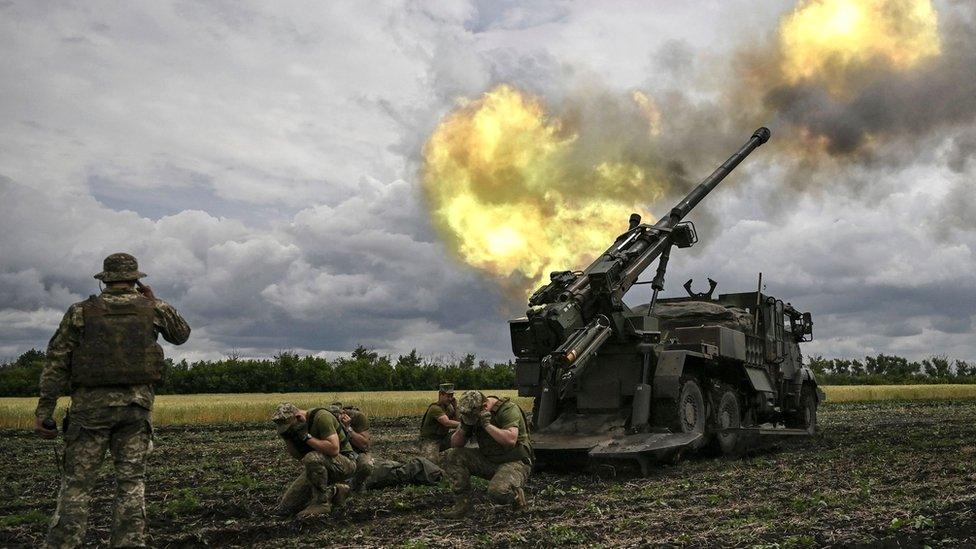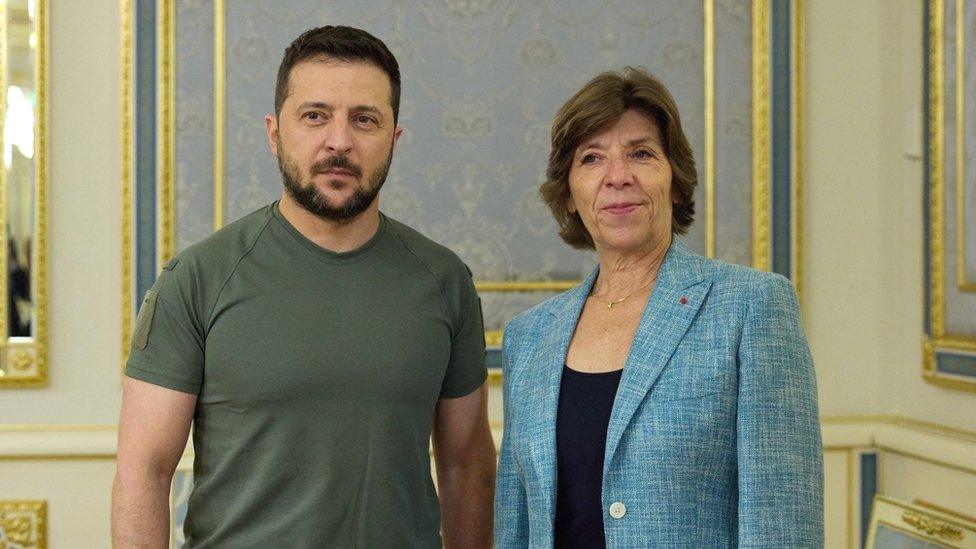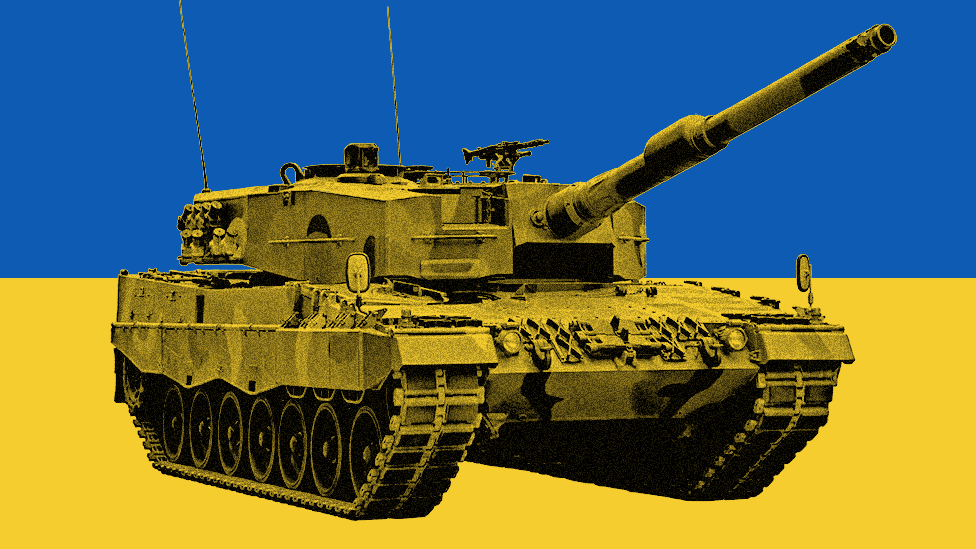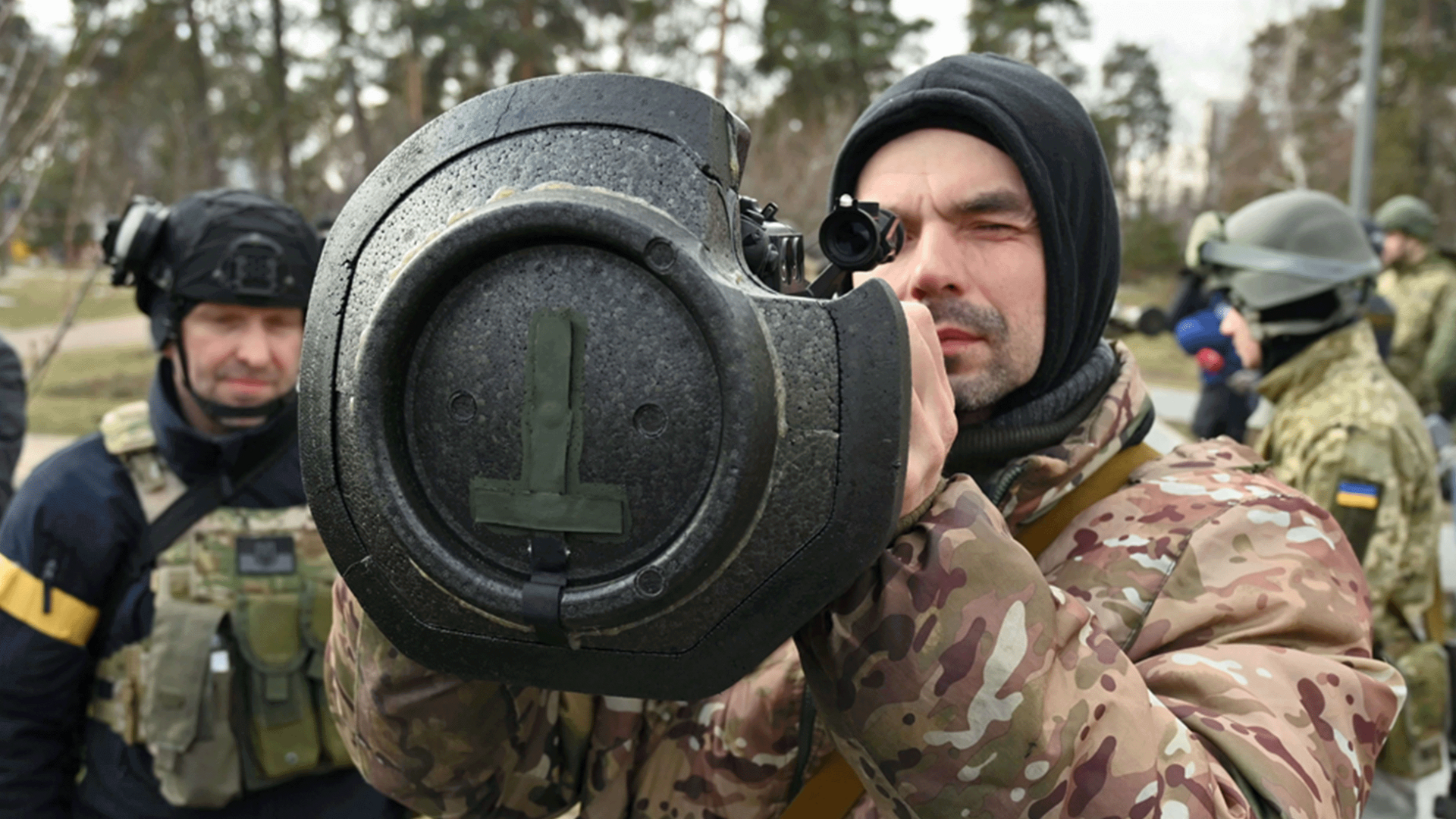Ukraine war: Questions over France's weapons supply to Kyiv
- Published

Less than 2% of foreign arms deliveries to Ukraine are contributed by France
If France wants to lead Europe to a new era of military self-reliance, how come its contribution to the war effort in Ukraine is so small?
That is the awkward question being posed by some of the country's top strategic thinkers, who are pushing President Emmanuel Macron to make an urgent decision on more arms to Kyiv.
Recent analysis conducted on the ground in Poland and Ukraine shows that the French share of foreign arms deliveries is less than 2%, way behind the US on 49%, but also behind Poland (22%) and Germany (9%).
"I was concerned about the reliability of the statistics which showed France low on the list of contributing countries," says François Heisbourg, who is perhaps France's most influential defence analyst.
"So I went out to the main distribution hub in Poland to see how much in tonnage was actually being delivered, rather than just promised.
"Unfortunately the figures bore out my fears. France is way down the list - in ninth position."
The official reaction to this in Paris is: "Yes, but..."
Yes, the aid statistics are unflattering, but there are other factors at work.
First, defence officials say the true measure of military help is quality not quantity. Some countries are delivering masses of outdated equipment. France has given 18 Caesar self-propelled artillery units, which are now celebrated along the Ukrainian front-line.
France, they add, is like other Western countries in having run down military stocks as part of the post-Cold War peace dividend.
I had the distinct feeling we [France] were becoming irrelevant.

Ukraine's Caesars are fully one quarter of France's entire mobile artillery. It cannot offer much more without making itself vulnerable in regions where it is already committed, like the Sahel and the Indo-Pacific.
"It might look like we are behind other countries, but France has every intention of playing its part," says Gen Jérome Pellistrandi, editor of the National Defence Review.
These arguments are not without merit, says Mr Heisbourg. The problem is that by not being more present in theatre, France risks writing itself out of the plot.
"When I was in Kyiv, everyone was very polite. I had no sense that the Ukrainians disapproved of us," he says. "In a way it was worse. I had the distinct feeling we were becoming irrelevant."
For Mr Heisbourg the equation is simple. Ukraine will talk to countries who it knows are likely to deliver the weapons it needs. France at the moment is not one of them.

French Foreign Minister Catherine Colonna discussed the supply of defence equipment with President Zelensky in Kyiv
But there is another danger for France. Its relative absence in Ukraine undermines its bid for leadership in the cause of European defence.
Already many countries of eastern Europe are wary of President Macron, who they believe was far too indulgent towards Russia's Vladimir Putin in the first months of the war. A narrative has taken root according to which France still feels ambivalent about an outright Ukrainian triumph.
For Pierre Haroche, who lectures on international security at Queen Mary University of London, this narrative is unfair - and is not the reason for France's low levels of arms deliveries to Ukraine.
However, he is firmly of the view that France should beef up its contribution as early as possible, in order to reassure central and eastern European countries like Poland that "we are all on the same page".
"France's goal of strategic autonomy for Europe is focused primarily on building up our defence industries via joint procurement. But if you want joint procurement, you have to demonstrate to other countries that you have the same vision about our common security," he says.
"In order to make our objective of European co-operation viable, we need to show eastern European countries that co-operating with France and buying the idea of strategic autonomy is not a strategic risk."
Dr Haroche is calling for France to send 50 Leclerc main battle tanks. Mr Heisbourg would prefer air defence systems, which he says Ukraine is more in need of.
"It is like a fire extinguisher," says Dr Haroche. "If there is a fire in a neighbour's house it is better to offer your extinguisher straightaway, and not wait till the fire reaches your own home.
"It's not just generosity. It's also for your own protection."
Related topics
- Published17 February

- Published15 May 2023

- Published27 June 2022